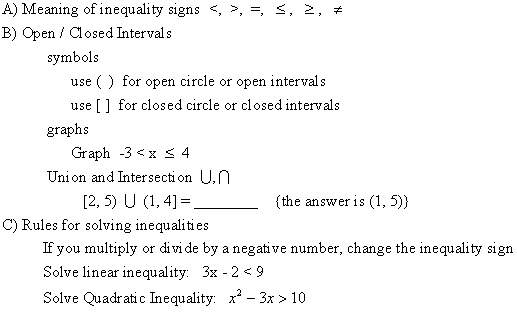Lesson #2
Absolute Value and Symmetry
|
Quote of the Day: "Math Class is tough." – Barbie (doll) 1992
Objectives:
The student will learn two formal definitions of absolute value.
The student will apply the piece-wise defined definition of absolute value
to solve inequality problems.
The student will graph the absolute value function.
The student will determine whether a function has symmetry with respect to
the x-axis, symmetry with respect to the y-axis, symmetry with
respect to the origin, or symmetry with respect to the line y = x.
1. Collect Homework Assignment.
Requirements for Homework assignments:
1. Name
2. Page Number
3. Write down the original problem on your paper
4. Show work (even if you use a calculator!).
You must show the set-up for each problem!
5. Check the odd-numbered answers in the back of the book (AFTER you have
worked the problem!). Put a check or an x by each odd problem.
As Mr. Folb would often say,
"The math student's best friend is BOB (the Back Of the Book),
but just remember that BOB doesn't come to school on test days."
2. Calculus Study Tips
Click here for Calculus Study Tips
3. Inequalities 
4. Absolute Value 
5. Symmetry
Example: Determine the symmetry of (-5, 2) Use a coordinate graph.
Symmetry with respect to the y-axis: __________ [Answer is (5, 2)]
Symmetry with respect to the x-axis: __________ [Answer is (-5, -2)]
Symmetry with respect to the origin: __________ [Answer is (5, -2)]
Symmetry with respect to the line y = x: __________ [Answer is (2, -5)]
Rules (but don't memorize):
Symmetry with respect to the y-axis: (x, y) <-> (-x, y)
Symmetry with respect to the x-axis: (x, y) <-> (x, -y)
Symmetry with respect to the origin: (x, y) <-> (-x, -y)
Symmetry with respect to the line y = x: (x, y) <-> (y, x)
Tests for Symmetry:
Symmetry w.r.t. the y-axis: f(x, y) = f(-x, y)
(Substitute –x for x and see if the equation is the same.)
Symmetry w.r.t. the x-axis: f(x, y) = f(x, -y)
Symmetry w.r.t. the origin: f(x, y) = f(-x, -y)
Symmetry w.r.t. the line y = x: f(x, y) = f(y, x)
Examples:

Puzzle from Ask Marilyn column (December 11, 1994 PARADE Magazine)
The letters of the alphabet can be sorted into the following categories:
(1) H I O X
(2) A M T U V W Y
(3) B C D E K
(4) F G J L N P Q R S Z
What defines the categories?
Answer: (1) symmetric w.r.t. x-axis and y-axis
(2) symmetric w.r.t. y-axis
(3) symmetric w.r.t. x-axis
(4) no symmetry w.r.t. x-axis or y-axis
Picture of Denzel Washington (from Reader's Digest December 1996)

Symmetry Activity with the Digital Camera
6. Perfect Symmetry in RFK Stadium -- home of the Washington Nationals
7. Comic Strip about Calculus Endorsements 8. I Promise I won't Do This... (Comic Strip)
9. Assignment:
Read pages 5, 6, 7, 34, 35
p. 14 (23a, 24a)
p. 61 (58, 59, 62, 66, 67)
Study for Quiz on Trig
Continue to work on Mini Exam #1 Review
Click here for Jill Briton's excellent activities with Symmetry
|

